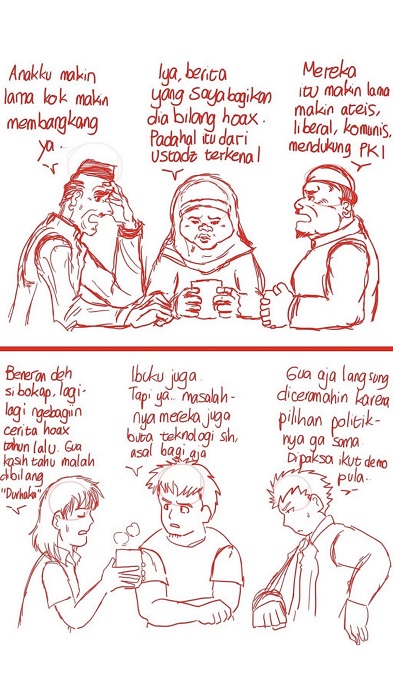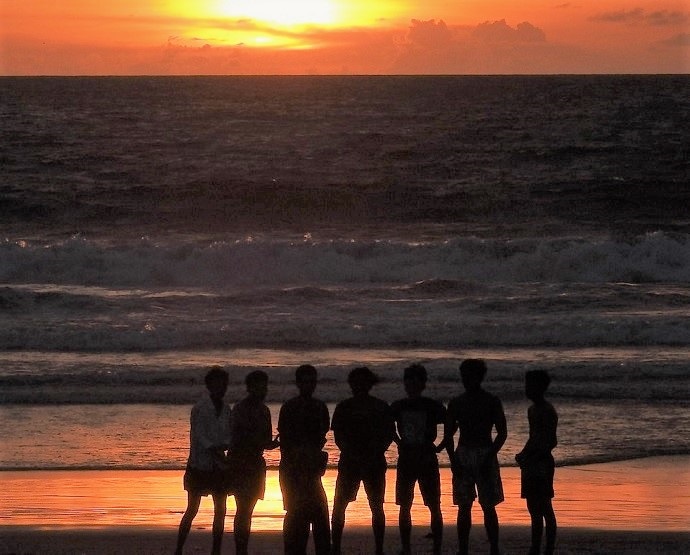When religion is harsh, atheist friends become family
When religion is harsh, atheist friends become family
Karina
For me, being born in a Muslim family, in predominantly Muslim Indonesia, doubting and leaving the religion was surprisingly easy. Religions do not make sense, God does not exist. Just like that.
Oh well, that’s not entirely true. It just seemed so easy at the time to disregard the concept. I had decided. My mind was made up.
It started with my reading habit. Even as a kid, I loved reading. That’s how I learned about the world. How big it is. How varied people are. So many different cultures and ways of life. It opened my eyes about many things that were unimaginable before. I had never been told these things. Those around me had taught that there was only one true way of life, which we all need to follow. All the other ways were wrong. But why? Why are there thousands or even millions of different ways of living, out of which only one is correct? And nota bene that one was thought up by a God who is all-powerful? Another unanswerable question that came from my reading was this: If everything is created, by God, then who created God? Who created God’s God? And so on…
There you go. My brain started a new custom – question everything. Fast forward, years later, I became an atheist. It was a long process, but I enjoyed it. I was satisfied by the result.
The hard part was to come out as my true self while still maintaining good relationships with everyone. Most people still find it impossible to accept the idea that someone can be human without having a religion. Worse than not accepting the abstract idea, they condemn those who succeed in living their life like that.
This obtuse insistence on the necessity of religion might go right back to the origins of the country in 1945. Indonesia´s founding principles, incorporated in the preamble to the constitution, are five rules of life known as Pancasila. The first rule is ‘There is One God’. This is interpreted to mean that every citizen must belong to one of only six legally approved religions, displayed on their identity card. Being an atheist is not an option. It is considered blasphemy, a severe crime punishable by up to five years imprisonment.
Alone
I was only around 10 years old when I realised I was ‘abnormal’. I felt so alone, and too afraid to open up about it. I knew that even the slightest doubting question about religion would get me scolded by my parents, teachers, friends and basically everybody around me. It worried me that, if they were ever to find out what was really on my mind, they would abandon and ostracise me. Someone who has left Islam becomes a kafir. Even if that kafir is a child, the Qur’an states that she or he must be cut off from their family. For years I kept my mouth shut. At the same time I knew – they can stop you from speaking out, but not from thinking.
There I was, pretending to be a good Muslimah for half my life. I even wore the hijab, the Islamic head-dress, throughout my years at junior high school. I went to school in Tasikmalaya, in West Java, one of Indonesia´s most religious cities. People refer to it as ‘Kota Santri’ – the city that produces Muslim clerics. Some time after reformasi, the local government made wearing the hijab to schools and offices obligatory. If I wanted an education, I had to comply. So I wore it to school for two years, but would take it off when I got home. Many other girls and women did the same at first. After a while though, most began wearing it everywhere they went. It became their identity. Taking it off would mean being one of ‘the bad ones’.
When I turned 16 and reached senior high school, I moved to a different school. Hijab was no longer compulsory, but strongly recommended, even for non-Muslims. But I decided to stop wearing mine. It was time for me to start living as myself. I was the only ‘officially Muslim’ girl in that school not to wear it. I still joined some religious activities and classes because they were mandatory. Every other day, I had to face ‘reminders’ from a lot of teachers about my appearance. ‘Hi Karina! When will you cover your head as Allah has asked you?’ I would just reply with a smile.
I excelled at my science studies, and that became my bargaining chip. I became an important student for them. An asset whom they could send to represent the school at regional science competitions. I even made it to the national Mathematics Olympiad. Yes, I figured this was how I could buy my freedom – be a valuable enough asset. And this was what I became for my family too. I made my parents proud by being their smart and successful daughter.
Upon obtaining my university degree, I started to work and support both my parents and three younger siblings financially. My father had been unfortunate enough to lose his job. Even then, I still didn’t come out to them as an atheist. I knew they would find it very difficult to accept.
Until one day, the coming-out happened. I didn’t mean to do it. It just happened. My mom started crying. My dad tried to reason with me – about how important religion was and about how, of course, Islam was the one and only true religion. Well, in the end we agreed to disagree. Not surprisingly, the relationship became awkward. I was not a daughter they could be proud of anymore. For a while.

Second family
In 2011, I started face-to-face gatherings of atheists in Jakarta. We met through a Facebook group called Indonesian Atheists. Other groups formed outside of Jakarta. It went really well. The meetings have continued even now that I’m not living in Indonesia anymore. We are an ostracised minority. The best thing about these gatherings is that we don’t feel so alone anymore. We can share a lot of things without being afraid of judgments. We try to support each other. We form a family – a big one. There are thousands of us around the country.
Some media started to write about us. I was even featured in The New York Times. To nobody´s surprise, I got some threatening messages from old friends and even from strangers who knew who I was. Some of my aunts and uncles warned my parents that if they couldn’t convert me back to Islam, I would drag the whole family along with me into hell. Seriously. Not even with a question mark. Things between me and my parents grew even more tense. At least, the strain showed three or four times a year, whenever I visited them, since I had been living by myself since I was 17.
However, this changed in 2015. My Indonesian atheist friends helped me through my lowest months, both physically and financially. I was admitted to a hospital in Singapore suffering from a critical condition. I was in between jobs and couldn’t afford the medical costs. I had no medical insurance. Hundreds of atheist friends raised money to help me out. As a result, I’m still alive and well right now, to tell you this story.
My parents were so grateful for this help. I told them that even though people like us do not believe in heaven, we are still always trying our best to be good people. Isn’t that real sincerity? Altruism that doesn’t rely on some heavenly compensation?
Since then, my parents have come to accept me as I am now, 100 per cent. They even enjoy conversations with some of my Indonesian Atheists friends, who visit us when I go back home to Bandung. They admit that these friends are really nice and smart. Not long after first meeting them, my parents told me they felt sorry for their judgmental behaviour towards non-religious people. They said it had been a new concept to them. They would keep their religion but they would, from now on, be more open-minded towards the beliefs or non-belief of others.
My parents were like so many Indonesians, who judge without knowing better. When I still lived in Indonesia, I experienced it often with religious colleagues and friends. Yes, some still don’t show acceptance, even now, and I can live with that.
We, Indonesian atheists, notice that many religious people feel threatened by our existence. This is completely unnecessary. When we gather as a group, we never make evil plans to attack religion or convert people to atheism. We are just there to support each other. Most members still live a fearful double life in front of their families and colleagues. Indonesian Atheists has become their second family, where they can be themselves. We do not only talk about atheism. Like any other community, we help each other out with ‘best practices’ that may have no connection to atheism at all. Our message to religious Indonesians is ‘Don’t be afraid of us. If my parents could become more open-minded about atheism, without losing their own strong belief in Islam, I’m very sure you can too.’
Karina (karin.isme@yahoo.com) is now pursuing her career in Singapore. She remains actively involved in Indonesian Atheists activities. The New York Times article was by Sara Schonhardt, ‘For Indonesian atheists, a community of support amid constant fear’ (26 April 2013).












